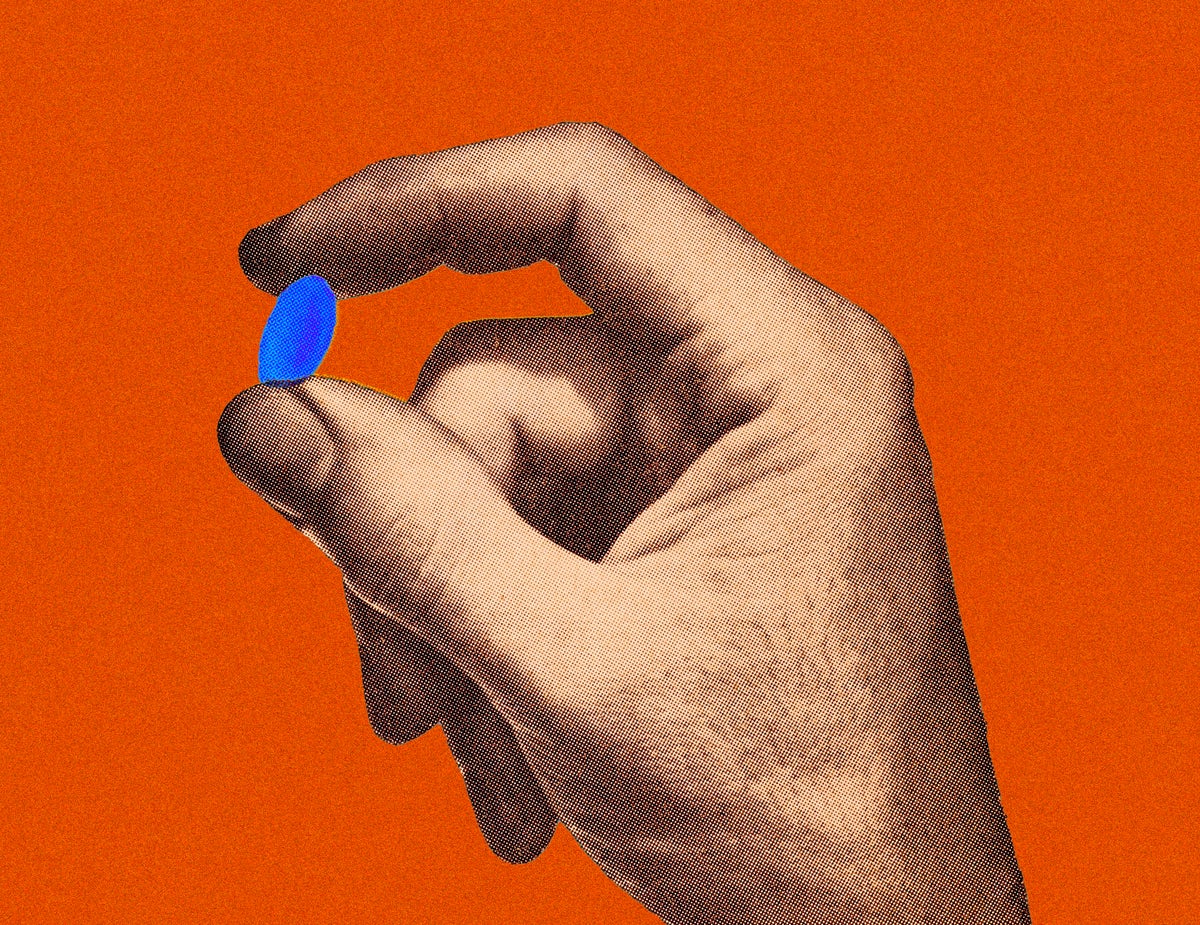
After the breakup of a five-year relationship, James was nervous about dating again. He was 27, healthy, and had a good sex life. But when it came to sleeping with new people, he was experiencing “performance anxiety”. “I was really struggling to get it up,” he says. “I got to this point where I was having sex with lots of people with like a 75 per cent error rate.” James assumed the problem was just nerves. He didn’t seek advice from his GP. Instead, he started self-medicating with sildenafil – better known as Viagra. It worked instantly.
“When you take it, you can actually focus on enjoying the sex and being in the moment,” he says, “as opposed to thinking, ‘Oh my God, my d*** is failing. No! No! Don’t stop! Keep going!’” When he started dating someone new, however, James felt an even greater need to rely on the drug. Wanting to make sure he wasn’t a disappointment, and sensing they were about to have sex, James decided that – just to be sure – he would “double drop” two maximum strength 100mg pills. His new partner, though, wasn’t in the mood, and fell asleep next to him.
“I felt like my penis was about to explode,” says James. “I was incredibly faint.” He recalls the blood capillaries on the surface of his eyes looming into focus as he stared into the darkness. He was deeply uncomfortable. “I needed to pee,” he says, “and so I was peeing from probably about two or three meters away to land it in the toilet.”
Now in his thirties, James still takes Viagra regularly. He never told his partner what he had done. And on that point, he is not alone. He estimates that as many as half of his male friends have told him they take Viagra, and he suspects that even more do so in secret. Some, like Josh, 27, admit to taking it mainly as a recreational drug to enhance the sexual experience – “I tried it and it was like I was 14 again.” The pill is usually associated with older men. But increasing numbers of men under 50 are now taking sildenafil too.
The possible side effects include a reduction in efficacy over time, as well as more serious outcomes. “Long-term use of Viagra can potentially increase the risk of psychological dependency and has also been associated with various problems affecting the hearing and visual systems and vision,” says Dr Shirin Lakhani, a doctor who offers specialised erectile dysfunction treatments at her private London clinic. “Short-term serious side effects include strokes and heart attacks in very rare cases, as well as diarrhoea and gastritis.”
Figures released to The Independent by pharmaceutical company Viatris show that between May 2020 and May 2021 Viagra Connect sold more than seven million tablets in the UK. According to the company, more than 60 per cent of UK users are between 25 and 54 years old.
What is painfully obvious to me is that women in their thirties obsess and revel in the minutiae of the male anatomy
The drug is far more accessible than it used to be thanks to a relaxation of controls. Viagra Connect, released in 2018, is an over-the-counter form that can be obtained without a prescription. It has become so popular that last month Boots announced the launch of its own generic version, which will be priced more cheaply than the big name brand. Generic sildenafil can also be bought online with a prescription, which can be obtained relatively easily by answering a brief consultation. “Of our erectile dysfunction custom base, 9 per cent are in their twenties and 21 per cent are in their thirties,” says Abbas Kanani, an online pharmacist.
That adds up to a lot of young users. And although erectile dysfunction is still a topic that is somewhat taboo among young men, it seems to be very common. According to one 2018 study, around half of British men in their thirties report difficulties getting or maintaining an erection. Like James, however, young men with erectile dysfunction are not necessarily talking to their doctor about it. “In my role as an NHS GP, I see almost no men in their twenties and thirties with erectile dysfunction,” says Dr Luke Pratsides, who also works for a commercial men’s health website. “This is likely because young men do not access traditional channels of healthcare and perhaps do not want to have multiple touchpoints to discuss sexual function, which for many can be difficult to talk about.”
In bypassing their doctor, men are missing out on a proper diagnosis. James has never asked his doctor about the underlying cause of his erectile dysfunction – but he suspects that he is experiencing some level of performance anxiety. This is broadly defined as men who don’t necessarily have a problem every time they have sex, or when they masturbate, but who – like James – take comfort in knowing that the pill will help them if they get locked in a boner-killing spiral of negativity. “If I was going to sleep with someone for the first time, I get anxious, so I take it,” James says. “But over time I get more comfortable around them – and then I don’t really need it.”
Performance anxiety is a common but little discussed cause of erectile dysfunction, according to Peter Saddington, a sex therapist who works in the Andrology department at Sheffield Royal Hallamshire Hospital. “Anxiety releases a chemical in the brain that has an adverse effect on erections. It goes against feeling relaxed and sexual,” he explains. The problem is often exacerbated by the excitement of having sex with someone for the first time. “The body interprets excitement as also close to anxiety, because you’re meeting a new person.”
“At a certain point,” Saddington notes, even sildenafil will stop working. “Viagra doesn’t give you an erection; it facilitates the natural process, so if you’re becoming increasingly anxious, eventually your anxiety can override the effect of sildenafil.”
James says he always feels anxious about his sexual performance – but especially with a new partner – and recalls the first time he heard some of his female friends talking about sex. “What is painfully obvious to me is that women in their thirties obsess and revel in the minutiae of the male anatomy,” James says. “It’s like girth, length, motion. Everything is absolutely pored over – and with so much relish – in front of their friends. So having witnessed that – at a table with people I’ve actually slept with – I’m aware of just how much pressure there is on delivering good sex.

It is unclear how James’s sexual partners feel about it, because for the most part, he doesn’t tell them. But Wendy, 37, says that she would be unhappy to discover that her boyfriend was secretly taking Viagra. “Because I would feel like, oh, am I not enough?” she says. “But then I get that [erectile dysfunction] is more common as guys get older.” To her knowledge, she has only had sex with a man taking sildenafil once: a one-night stand, in which she found out afterwards from a mutual friend. The sex was average, a fact that Wendy chalks up partly to the drug. “There was something slightly fake about it. It wasn’t connected, passionate sex that I suppose I have had with someone not on it.”
Viatris, a subsidiary of pharmaceutical giant Pfizer that manufactures Viagra, provided some data to The Independent from a survey of 5,007 people – including 2,445 men – they commissioned in 2020. One of the questions they asked was “what are the top three barriers preventing you from being more intimate?”. Nine per cent of 18 to 24-year-olds and 10 per cent of 25 to 34-year-olds identified “Sexual issues, eg struggling to get or maintain an erection” as the top reason. Of all the men who’d experienced erectile dysfunction, almost a third (29 per cent) said it was because they were “worried about not being able to get or maintain an erection”.
The underlying causes of erectile dysfunction can be more complex, however. “Erectile dysfunction is often dismissed as psychological [or] stress-related and temporary and self-limiting in younger men,” says Dr Lakhani. “However, whilst psychological reasons may play a part, it is important to realise that there may be medical conditions causing ED in younger men too. Mental health disorders such as depression and anxiety impact erectile function either directly or as a side effect of the medications used to treat them.” Lifestyle factors, such as smoking, drinking and obesity, can play a part too, says Dr Lakhani, as can cardiovascular disease or diabetes.
Performance anxiety is often present in erectile dysfunction, she notes – but that does not mean it is the cause. Dr Lakhani suspects that the incidence of erectile dysfunction may be “far higher than reported due to the stigma and shame surrounding sexual health problems”. Getting a proper diagnosis for the underlying causes of erectile dysfunction is important.
*Names have been changed







